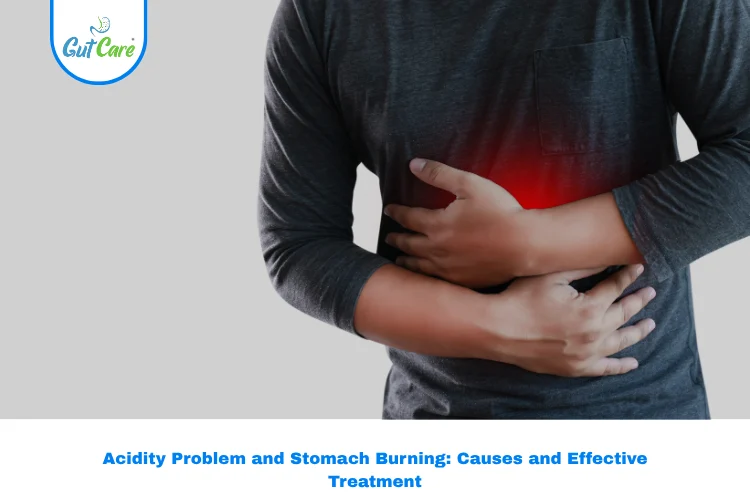The acidity problem is one of the most common digestive issues people experience today. It often appears as stomach burning after eating, bloating, or a sour feeling in the throat. If you’ve ever wondered, “Why is my stomach burning?”, the answer usually lies in excessive stomach acid production.
At Gutcare Clinics in Bangalore, Dr. Yuvrajsingh Gehlot, an experienced colorectal surgeon, helps patients understand the reason for stomach burning, find lasting relief, and learn how to control acidity effectively. Understanding what causes this discomfort is the first step toward lasting digestive health.
What Is an Acidity Problem?
The acidity problem occurs when your stomach produces more acid than required for digestion. This excess acid can flow up into the food pipe (esophagus), causing irritation and the familiar burning sensation known as heartburn.
Normally, your stomach is designed to handle acid safely, but when the balance is disturbed through poor eating habits, stress, or medical conditions it leads to discomfort, pain, and inflammation.
The goal of proper acidity treatment is to restore balance, protect your digestive lining, and reduce acid production safely.
Why Is My Stomach Burning? Common Causes Explained
If you often ask yourself “Why is my stomach burning?”, there are several possible reasons. Identifying the reason for stomach burning is key to effective management.
- Irregular Eating Patterns
Skipping meals or eating large meals at odd hours can cause acid buildup. - Spicy or Oily Foods
These foods irritate the stomach lining and increase acid production. - Stress and Anxiety
Emotional tension can directly influence acid levels in your stomach. - Excess Caffeine or Alcohol
Coffee, tea, and alcohol weaken the stomach’s protective lining. - Certain Medications
Painkillers and anti-inflammatory drugs can irritate the stomach. - Poor Sleep Habits
Eating right before bed or lying down after meals worsens acidity symptoms.
These triggers often combine, leading to persistent stomach burning after eating and indigestion.
Stomach Acid Symptoms You Shouldn’t Ignore
Recognizing stomach acid symptoms early helps prevent long-term damage. Common signs include:
- A burning sensation in the upper abdomen or chest
- Sour or bitter taste in the mouth
- Nausea or vomiting after meals
- Bloating and discomfort
- Loss of appetite
If these symptoms occur frequently, you may need medical evaluation. Chronic acidity can lead to ulcers, reflux disease (GERD), or other digestive complications if left untreated.
How to Control Acidity Naturally
While medicines can provide quick relief, making small changes to your daily routine is crucial for long-term control. Here’s how to control acidity effectively:
- Eat Smaller, Balanced Meals
Avoid heavy portions; opt for light, frequent meals throughout the day. - Stay Hydrated
Drinking enough water helps neutralize acid levels. - Avoid Trigger Foods
Limit spicy, fried, or citrus-based foods. - Don’t Lie Down After Eating
Wait at least 2 hours before lying down to prevent acid reflux. - Manage Stress
Try yoga, deep breathing, or light exercise to balance digestion. - Quit Smoking and Reduce Alcohol
These habits weaken your stomach lining, increasing acidity risk.
These simple steps can significantly reduce the acidity problem and prevent recurring episodes.
What to Do for Acidity: Medical and Home Remedies
When lifestyle changes aren’t enough, a combination of home remedies and medical care offers relief. Here’s what to do for acidity depending on severity:
Home Remedies
- Cold Milk or Buttermilk – Neutralizes stomach acid naturally.
- Bananas – Act as natural antacids and soothe irritation.
- Ginger Tea – Helps reduce inflammation and nausea.
- Aloe Vera Juice – Calms the digestive tract.
Medical Treatments
If symptoms persist, visit a specialist like Dr. Yuvrajsingh Gehlot at Gutcare Clinics, Bangalore. Treatments may include:
- Antacids to neutralize acid.
- H2 Blockers and PPIs to reduce acid production.
- Lifestyle guidance to address underlying triggers.
A professional evaluation ensures you get a safe, personalized approach for long-term results rather than temporary relief.
How to Reduce Stomach Acid Safely
Reducing acid doesn’t mean stopping digestion it means restoring balance. Here’s how to reduce stomach acid while maintaining gut health:
- Eat slowly and chew food properly.
- Avoid carbonated drinks that increase gas.
- Sleep with your head slightly elevated.
- Include fiber-rich foods like oats and vegetables.
- Limit processed or sugary foods that worsen acid production.
A balanced diet combined with medical advice forms the most effective acidity problem management plan.
When to See a Doctor
If you experience stomach burning after eating regularly, over-the-counter medicines may not be enough. Persistent acidity may signal gastritis or acid reflux disease.
Consulting a digestive health specialist at Gutcare Clinics, Bangalore, can help identify the reason for stomach burning accurately. With modern diagnostics and personalized care, Dr. Yuvrajsingh Gehlot provides safe and effective treatment tailored to your needs.
Early intervention prevents complications and ensures faster recovery.
Conclusion
The acidity problem is common but manageable. By understanding the stomach acid symptoms, identifying the reason for stomach burning, and learning how to control acidity, you can protect your digestive health and enjoy meals without discomfort.
If you experience frequent burning or indigestion, seek professional guidance from Gutcare Clinics in Bangalore. Under the expertise of Dr. Yuvrajsingh Gehlot, you’ll receive evidence-based care focused on lasting relief and preventive wellness.
A healthy gut leads to a healthier life don’t ignore what your stomach is trying to tell you.
Frequently Asked Questions (FAQs)
1. What causes the acidity problem?
The acidity problem occurs when your stomach produces excess acid, often due to spicy foods, stress, or skipping meals.
2. Why is my stomach burning after eating?
The reason for stomach burning after eating is acid reflux, which happens when stomach acid rises into the food pipe after a heavy or spicy meal.
3. How to control acidity naturally at home?
To learn how to control acidity, eat on time, avoid fried foods, drink water regularly, and include more fruits and fiber in your diet.
4. What to do for acidity if it keeps coming back?
If the acidity problem persists, consult a specialist for medical evaluation and treatment instead of relying only on home remedies.
5. Does Gutcare Clinics in Bangalore treat acidity problems?
Yes, Gutcare Clinics provides advanced acidity problem treatments under Dr. Yuvrajsingh Gehlot, offering safe, long-term relief for digestive issues.




